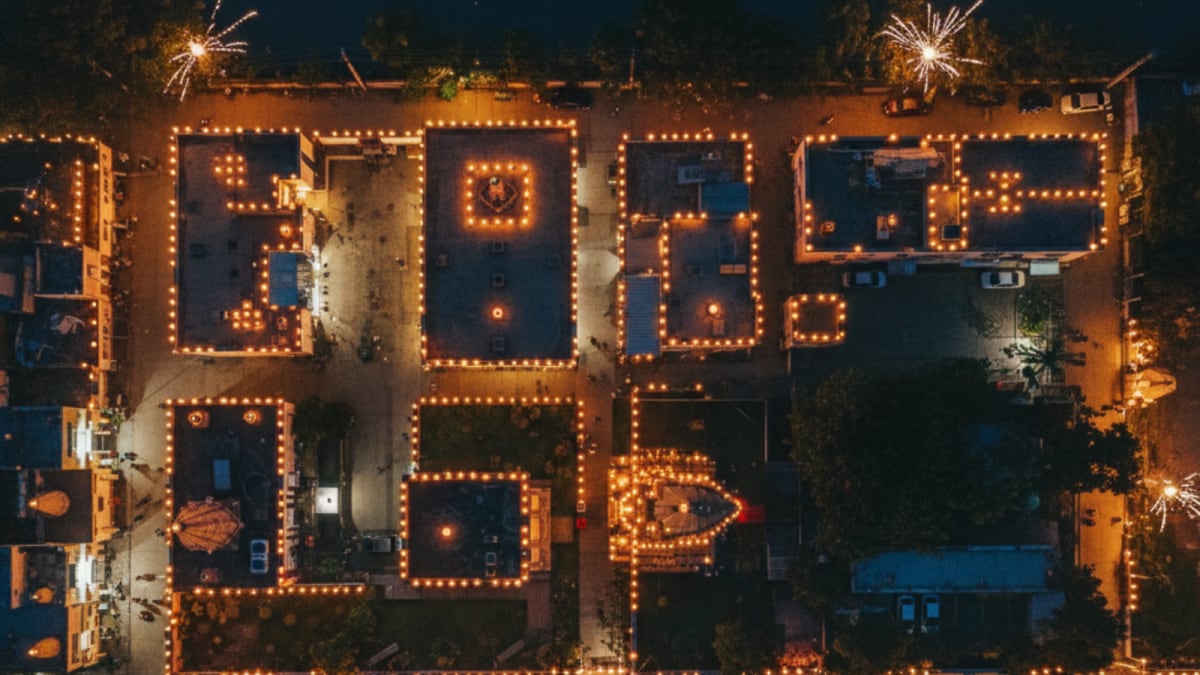Last Updated:
From cattle worship in Karnataka to fiery effigies in Goa, every part of India celebrates the victory of light over darkness in a unique language of faith and festive celebrations.

Diwali celebrations takes on new names, new rituals, and new meanings (Image: AI generated)
India celebrates Diwali not as a single festival, but as a thousand stories told in light. Each state, town, and home interprets it in its own way through bonfires, lamps, sweets, prayers, or processions. What binds them is the spirit of renewal, victory, and community. For travellers, it is the perfect time to see how folklore, tradition, and local culture converge into one spectacular experience across the country.
From the western coastlines of Goa to the temple towns of Tamil Nadu, Diwali takes on new names, new rituals, and new meanings.
Here is a travel map to unique celebrations that show just how beautifully diverse India’s Festival of Lights can be.
Narakasur Chaturdashi, Goa
In Goa, Diwali starts early. On the morning before the main festival, the streets fill with giant effigies of the demon Narakasur, sometimes towering over buildings, crafted with papier-mâché and painted in bright reds and yellows. Just before dawn, these effigies are set ablaze to mark the victory of good over evil, symbolising the destruction of arrogance and darkness. The fiery spectacle is loud, chaotic, and deeply communal, with neighbourhoods competing over who builds the grandest Narakasur.
Where to experience: Head to the towns of Mapusa, Margao, or Panjim a day before Diwali to witness the effigy parades and pre-dawn fireworks. The entire state comes alive in the hours before sunrise.
Badabadua Daka, Odisha
Odisha’s Diwali is deeply spiritual. As dusk falls, families gather in courtyards for the Badabadua Daka, lighting tall jute sticks called Kaunriya Kathi. They chant “Badabadua ho andhara re asa, aloka re jao”, calling upon their ancestors to visit in darkness and return along the path of light. It is a quiet, emotional ritual that honours lineage and memory.
Where to experience: Puri and Cuttack offer the most moving experiences. The coastal breeze carrying the scent of lamps and incense makes this an unforgettable evening of ancestral reverence.
Dev Deepawali, Varanasi
A fortnight after Diwali, Varanasi celebrates Dev Deepawali, believed to be the day when the gods descend to bathe in the Ganges. Every ghat along the river is lit with thousands of diyas that turn the water into a shimmering reflection of the night sky. The chants, the aarti, and the flickering lamps create a spiritual energy unlike anywhere else in the world.
In Ayodhya, believed to be the birthplace of Lord Rama, Diwali is celebrated as Deepotsav, a grand re-enactment of Rama’s homecoming. The city has broken Guinness World Records for lighting millions of diyas along the Sarayu river and across the ghats. The glow is visible for miles, transforming Ayodhya into a sea of gold and sound.
Where to experience: The Dashashwamedh, Assi, and Panchganga ghats are the most breathtaking spots. Arrive early evening to secure a view, or take a boat ride for a panoramic sight of the illuminated riverbanks.
Visit Ayodhya during the Deepotsav festival, usually held a few days before Diwali. The ghats along the Sarayu are the heart of the celebration, while the Ram Ki Paidi steps are the best vantage point for photographs.
Kali Puja, West Bengal
While much of India worships Lakshmi on Diwali, Bengal honours Goddess Kali. The city’s temples are decked in marigolds and incense, and clay idols of Kali stand tall amidst rows of oil lamps. The atmosphere is intense, more spiritual than festive, and yet utterly mesmerising. The night skies explode with fireworks, echoing the devotion of the city that never does anything halfway.
Where to experience: The Kalighat and Dakshineswar temples in Kolkata are central to the celebration. Many local households also hold smaller pujas, so walking through residential areas like South Kolkata gives a more intimate glimpse.
Chopda or Diwali Padwa, Western India
In parts of Maharashtra and Gujarat, Diwali marks the beginning of a new financial year. Traders and shopkeepers perform Chopda Pujan, a ceremony to sanctify their accounting books and seek blessings for prosperity. The days also include worship of cows and Govardhan Puja, before culminating in Bhai Dooj, celebrating the bond between brothers and sisters.
Where to experience: Mumbai, Surat, and Ahmedabad offer a fascinating mix of faith and commerce during Diwali week. Visit local markets to see how business and devotion intertwine in the festive bustle.
Pushkar Camel Fair, Rajasthan
In Pushkar, Diwali coincides with one of the largest livestock fairs in the world, the Pushkar Camel Fair. Traders, performers, and pilgrims gather by the holy lake, and the fairgrounds turn into a carnival of colour and sound. As night falls, the sands light up with diyas, and travellers find themselves surrounded by a desert glowing with festive warmth.
Where to experience: Visit Pushkar during the Diwali week when the camel fair is in full swing. The fairgrounds near Pushkar Lake host most of the cultural activities and local markets.
Karthigai Deepam, Tamil Nadu
In Tamil Nadu, Diwali extends into Karthigai Deepam, a festival dedicated to Lord Shiva. The highlight takes place in Thiruvannamalai, where a massive fire is lit atop the Annamalai Hill, visible for miles around. Devotees believe the flame represents divine light and eternal truth. Every home, temple, and street glows with rows of clay lamps, turning the towns into rivers of flame.
Where to experience: Thiruvannamalai is the centre of Karthigai Deepam. Plan your visit during the festival to witness the lighting of the sacred beacon, usually held in late November or early December.
Tihar, Assam
In the Himalayan regions of Sikkim, Assam, and Darjeeling, Diwali takes the form of Tihar, a five-day festival that celebrates not just Goddess Lakshmi but also animals. Each day is dedicated to a creature revered for its bond with humans- crows, cows, and dogs among them. Dogs, seen as loyal protectors, are honoured with garlands, tikas, and special meals.
Where to experience: The celebrations in Gangtok, Darjeeling, and Guwahati blend mountain charm with deep reverence. Visit local monasteries and homes to see how the rituals are performed with affection and devotion.
Neeru Tumbo Habba, Karnataka
In Karnataka, Diwali begins with Neeru Tumbo Habba, a ritual that symbolises purification. Homes are cleaned, washed, and freshly painted, preparing to welcome Goddess Lakshmi. The following days are devoted to Lakshmi Puja, Govardhan Puja, and Bali Padyami — each marked by floral decorations and intricate floor patterns. Entrances are adorned with cow dung and sandalwood, materials believed to purify the home and invite prosperity.
Where to experience: Villages and towns around Mysuru and Bengaluru showcase the most authentic celebrations, where traditional customs are observed with community gatherings and festive foods.
Bandi Chhor Divas, Amritsar
For Sikhs, Diwali coincides with Bandi Chhor Divas, the “Day of Liberation”. It marks the release of Guru Hargobind Sahib from Mughal captivity along with fifty-two kings in 1619. The Golden Temple in Amritsar is transformed into a breathtaking spectacle, its golden domes reflected in the shimmering waters of the sarovar, surrounded by thousands of lamps. The air resonates with hymns, gratitude, and the fragrance of langar meals served to pilgrims.
Where to experience: The Golden Temple is at its most radiant during Bandi Chhor Divas. Arrive by sunset to watch the temple and its reflection merge into a tranquil glow of light and devotion.
To travel through India during Diwali is to see the country at its most expressive, a time when mythology turns into lived experience, and every region tells the same story in a different language of faith. From Goa’s fiery dawns to Tamil Nadu’s eternal flame, Diwali offers not just a festival, but a journey through India’s many ways of celebrating light, devotion, and renewal.
October 15, 2025, 13:00 IST
Stay Ahead, Read Faster
Scan the QR code to download the News18 app and enjoy a seamless news experience anytime, anywhere.








